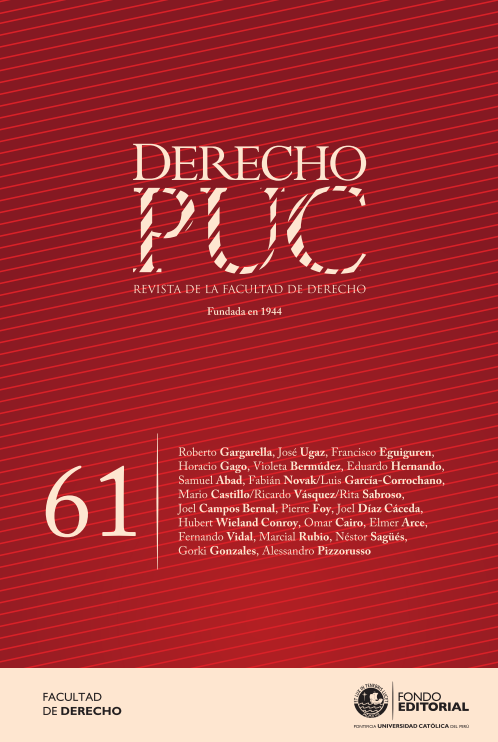El Pensamiento Constitucional de Pedro Planas
DOI:
https://doi.org/10.18800/derechopucp.200801.010Palabras clave:
Democracia Constitucional, Regímenes políticos, Poder político, Estado Social de Derecho, DescentralizaciónResumen
Este trabajo desarrolla los elementos del pensamiento constitucional de Pedro Planas. En ese sentido, establece el concepto de Democracia Constitucional, analiza sus características, tales como la división de poderes y la supremacía de la Constitución, y desarrolla sus diferencias respecto a la autocracia, que según este, es el sistema político. Siguiendo esta misma línea, se analizan las estructuras básicas de los regímenes políticos en la Democracia Constitucional. Esto se desarrolla en dos partes, en la primera, se dividen los esquemas políticos según el sistema de pesos y contrapesos, de esto se concluye la existencia de dos tipos de regímenes: el régimen parlamentario y el régimen presidencialista. En la segunda parte, se distinguen los regímenes según el origen de la estructura del poder gubernamental, en tal sentido, se establecen dos opciones: i) de estructura básicamente parlamentaria y ii) de estructura básicamente presidencialista. Es importante mencionar, que Pedro Planas, establece que durante el análisis de estas formas es normal encontrar mezclas, que se entienden como un tercer sistema (tertium). Asimismo, el autor desarrolla los tipos de Estado que pueden existir según organización territorial del poder político en la Democracia constitucional. Se distinguen tres tipos principalmente: i) Estado unitario, ii) Estado federal y iii) Confederación. Por otra parte, el autor analiza la postura de Pedro Planas respecto a la estructura de los regímenes políticos en América Latina; concluyendo que el régimen político preponderante en Latinoamérica es el presidencialismo y que este sigue el modelo de los regímenes europeos. Posteriormente, se analiza el concepto de Estado Social de Derecho, estableciendo que este surge de la confluencia entre el Estado de Derecho y el Estado Social. El autor desarrolla la posición de Pedro Planas con respecto a la distinción entre la Historia de las Constituciones y la Historia Constitucional. Como últimos puntos, se analiza la forma de gobierno y la descentralización en el Perú.
Descargas
Citas
Planas, P. (1992). Rescate de la Constitución. Lima: Abril Editores & Impresiones.
Planas, P. (1993). El Estado moderno (Apuntes para una nueva biografía del Estado Social de Derecho). Lima: Centro de Estudio y Promoción del Desarrollo.
Planas, P. (1993). La Constitución traicionada (con Domingo García Belaunde). Lima: Seglusa Editores.
Planas, P. (1994). La República autocrática. Lima: Fundación Friedrich Ebert.
Planas, P. (1997). Derecho parlamentario. Lima: Ediciones Forenses.
Planas, P. (1997). Regímenes políticos contemporáneos. Lima: Fondo de Cultura Económica.
Planas, P. (1998). Democracia y tradición constitucional en el Perú (materiales para una historia del Derecho Constitucional en el Perú). Lima: Editorial San Marcos.
Planas, P. (1998). La descentralización en el Perú republicano (1821-1998). Lima: Municipalidad Metropolitana de Lima.
Planas, P. (1999). El fujimorato. Estudio político-constitucional. Lima: Talleres gráficos Kelly.
Planas, P. (1999). Nuevas tendencias del Derecho Constitucional en América Latina. Arequipa: Universidad Católica de Santa María.
Planas, P. (2000). La democracia volátil. Movimientos, partidos, líderes, políticos y conductas electorales en el Perú contemporáneo. Lima: Friedrich Ebert Stiftung.
Descargas
Publicado
Cómo citar
Número
Sección
Licencia
Derechos de autor 2016 Derecho PUCP

Esta obra está bajo una licencia internacional Creative Commons Atribución 4.0.




